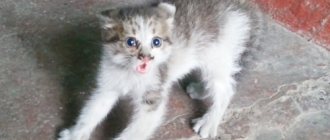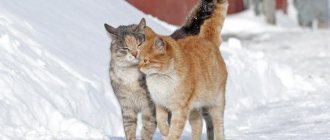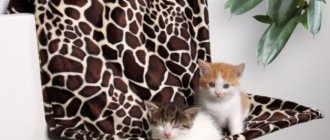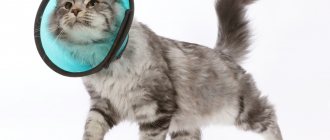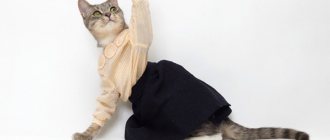Cats and cats are absolute favorites
Owners of cats and dogs feel a significant difference in the behavior of animals. For a dog, a person is a being of a higher order. When communicating with their relatives, they use the same behavioral models, and most often bow down to humans.
Cats put themselves on the same line as people; for them, the owner is a companion, which means their rights and responsibilities are equal. These pets are not going to adapt and serve, they are who they are. The owner must come to terms with their whims and love without any conventions.
Many researchers believe that cats think that people are big cats. Cats do not distinguish humans as a separate species, but see them as an equal partner.
Cats learn a lot from people
Cats make various sounds to attract attention to themselves and their needs, and scientists believe they learned this from humans. This is why domestic cats can be so talkative. They also treat different family members differently and are more affectionate to those who tend to get up at 4 a.m. to give them something to eat, Bradshaw says.
When a cat climbs onto a person’s lap and moves its paws, this is a form of behavior characteristic of kittens in relation to their mother, just like purring. In response, the mother licks the kittens, which is what cats actually seek from us - affection.
When asked if cats are trainable, Bradshaw replied that they are. You can teach them various tricks with the help of treats, but with unwanted behavior it is more difficult. If you want to stop your cat from jumping on the table, you will have to use negative reinforcement, such as splashing water, but try not to let the cat notice that the discomfort is coming from you. Cats do not know how to forgive and will stay away from a person who has given them a bad feeling.
Felines are very observant animals
The hunter's instinct lies dormant in every cat. They value the house as their territory and possessions. Nothing here should escape the observant eye. Pets sense the psychological situation and changes in the owner’s behavior. The well-being of the cat depends on this person.
Animals often copy the behavior of the owner and are subject to the mood of a person. Cats think that a person is a big cat whom they allowed to take care of them. Often cats show tenderness and affection towards their owner, this is a kind of gratitude for their care.
Cats in literature
True, no matter how imperfect people are, many of them understand well how intelligent the cats living next to them are.
It is not for nothing that so many cunning, intelligent and enterprising cats are found on the pages of works of world literature. Charles Perrault's Puss in Boots helps his completely passive owner get out of poverty and marry the princess (it is interesting that in one of the Russian dramatizations of the fairy tale, the princess prefers the Puss, because he is much smarter, more enterprising and prettier than the owner). Hoffmann's cat Murr appears to the reader as a wise philosopher, condescendingly observing people's lives. The Cheshire Cat in Lewis Carroll's fairy tale helps the lost Alice get out of the forest, constantly supports her, while at the same time making fun of both the days and everyone around her, including the Queen. Well, Bulgakov’s cat Behemoth is simply a fireworks display of wit and endless charm! So it’s worth taking a closer look at your cat and, perhaps, learning worldly wisdom from him.
Cats are great manipulators
In this regard, cats and children use similar techniques. A sweet and carefree appearance, tenderness and affection, but at the same time cunning techniques on how to achieve your goal with minimal effort.
Cats know their owner’s weaknesses and what actions have already led to results. Animals use these methods without feeling remorse. Now they no longer scold the pet, they handed him a treat and took him in his arms. The operation was carried out brilliantly!
Cats are susceptible to stress
But what struck the researcher most was how strongly some cat diseases are linked to stress. For example, he found that cystitis and dermatological problems can be solved without any drug treatment if two cats that do not get along with each other are moved to different places in the house.
In this regard, Bradshaw warns: if you want to take home another cat, try to do it very carefully and be prepared that you will have to part with the second pet if he does not get along with the old-timer. A cat is a much less sociable creature than a dog, and it is much more difficult for her to make friends.
Larisa Solodovnikova
Relationship between mother and child
Scientists compared the behavior of cats throughout life and realized that cats think of people as parents. The wild ancestors of cats were solitary animals with their own territory. To protect possessions, strong-willed qualities are required; there is no place for tenderness. However, when surrounded by family, cats are very affectionate and friendly. For this behavior and cheerful disposition, the pet is also appreciated by its owners.
Even in adulthood, when you need to get something from the owner, the obstinate pet turns into a small kitten. The meowing becomes plaintive, at higher frequencies, like that of a kitten. The animal makes eye contact. Now the owner is disarmed and ready to fulfill all requests.
Cats consider humans their equals and agree to take care of themselves. It warms us to think that we are on the same level with them, and not lower. Don't disappoint your pets and you will receive gratitude.
What does a cat think about and how does it perceive us, people. Do we know anything?
All of us, cat owners, periodically ask ourselves this question. So John Bradshaw, the author of several books about cats, who spent 25 years studying their behavioral reactions, tried to answer it. And this is what he managed to find out.
A cat perceives a person not as a friend or owner, but as a similar creature. Only big, not graceful enough and clumsy, capable of tripping over a cat several times a day, missing the moment of its appearance underfoot.
All thoughts of cats are determined by their natural needs. Their thinking is situational. If a cat wants to eat, she builds her behavior in such a way as to get what she wants as quickly as possible, and uses the usual methods: she gives her voice to the owner, spins around, approaches the bowl and meows persistently. She doesn’t think about how to better beg for something tasty, but acts based on the situation.
The behavior of an animal largely depends on its upbringing: some will start jumping on the table or stealing food from a set table, while others will patiently wait for the person to take out the food and fill the bowl. A hungry animal can express its joy and pleasure at what is happening by rubbing itself against our legs and purring loudly.
By the way, rubbing against a part of the body indicates the cat’s disposition towards you. Not everyone receives this honor. The cat has an idea of someone as a friend, while someone is indifferent to her, or even serves as a hindrance.
Living in an apartment, the cat thinks that this is its full habitat. It is very difficult to convince her otherwise; you can only correct her behavior using educational methods. For example, stop him from climbing on the table or sharpening his claws on the upholstery of the sofa.
A cat thinks of a person as a stable element of its living space. This differs from dogs, whose thinking lacks “object constancy.” That is, when a person disappears from a dog’s sight, it is a lot of stress for her; she does not understand where he disappeared, whether he will return or not. The cat is not tormented by such thoughts precisely because of its ability to perceive its familiar environment as a constant value.
Wanting to get their share of affection, cats climb on us, touch us with their paws and purr. This is exactly what they do with the mother cat; they did not invent any new ways to attract a person’s attention.
Cats have well-developed cognitive abilities. They often copy the behavior of people, becoming like them. If in a family every action is accompanied by a comment, then the cat will most likely also comment on its actions and movements, making characteristic sounds.
Cunning furry creatures easily remember how to get food by watching a person. Therefore, if necessary, they themselves open cabinets with edible supplies.
Cats think that the territory of the apartment is their undivided use, therefore, playing hunters, they do not think twice about destroying flowers, vases or other interior items. This is what the game requires, they don’t feel any regrets or guilt. They guess the seriousness of what they have done only by the stern tone of the person. Many cat owners are confident that their pet is even capable of apologizing for what happened, but, most likely, the cat is driven not by repentance, but by the risk of being left without food or the usual portion of affection.
Despite their outward independence, cats become attached to us and undoubtedly love us. They are not as emotional as dogs, who each time they return again experience deep joy from meeting each other. Cats realize that humans are a constant quantity, so they show their emotions in doses, depending on their mood.
This might be interesting
Can cats think?
Here we come to the main question, which was partially answered at the very beginning of the article. What do cats think about? Personally, as a person who now has a cat (and before that a dog lived for 18 years), I am absolutely convinced that animals have mental abilities, and they are dictated not only by instincts. A cat can worry, it can take care of its owner, it can be happy, it can be sad. At the same time, I am far from idealizing my favorites, but simply drawing logical conclusions from their behavior. Even scientists today admit that most animals are characterized by certain mental activity, and they are capable of making at least the simplest conclusions. And this fully applies to cats. I will give you one true story so that you can see for yourself. I won’t retell it, I’ll just leave a link. This story clearly shows that cats, as well as dogs, have not only instincts, but also feelings, and, moreover, intelligence.
Entertainment
Cats are natural hunters and can spend a lot of time (between naps) hunting down local rodents! Although cats are adept at finding entertainment for themselves, it is important to provide some extra stimulation so they can find a few things to play with inside or outside the house. Scratching posts and high-altitude activity areas, a wide range of interactive toys and other things that will appeal to your cat's hunting instincts will all help keep your cat healthy and active.
Routine
Cats can come home and go on their own schedule, but they can be very finicky if the external factors in their lives that you provide are not consistent and constant. Cats like to understand that the place and time of food supply is constant, that this procedure is carried out regularly, day after day. Cats don't like anything that changes their routine, which is how they understand their world. Events such as moving to a new home, visiting a cattery or leaving a stranger when you go on holiday, or changing the people who live with you can lead to a complete upheaval in your cat's world, which can be a cause of stress.
Try not to change the furnishings and equipment in your home too often. Keep your cat's bowls, toys, and favorite chair the same. If you need to change something around the house, it will take time for your cat to get used to it. You can make this transition easier for your cat by using old and new items together until your pet accepts the change.
Territory
Cats are territorial animals that can roam quite long distances. Your cat, once established in an area, will first draw the boundaries of the territory and then most likely stick to those boundaries. How far cats roam depends on a number of factors, including other cats that live in the area, access to the outdoors and green fences, and any natural boundaries such as dog gardens or busy gardens. expensive
Your cat's territory should, of course, include your home and garden, and since you can't avoid changes happening outside the home, you should do everything to protect the integrity of your own home. Don't allow dogs near your home unless you know your cat is familiar with them. Avoid encouraging other cats to stay away from your garden, and if you have visitors in your home, make sure they are aware of your cat's personal space.
